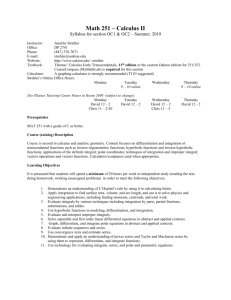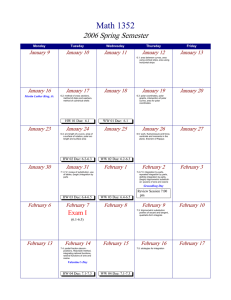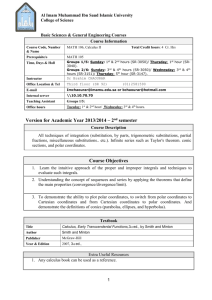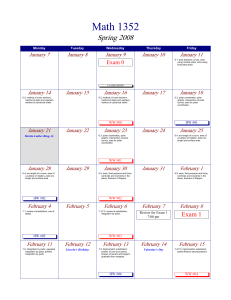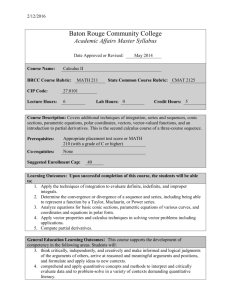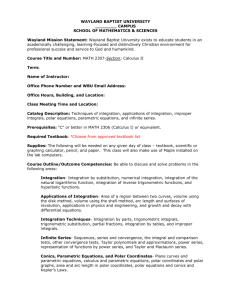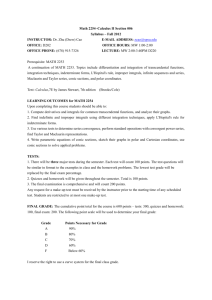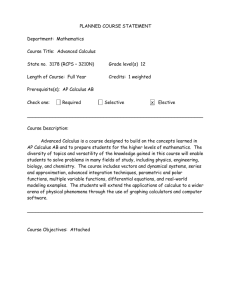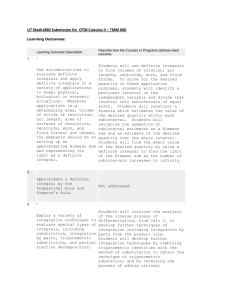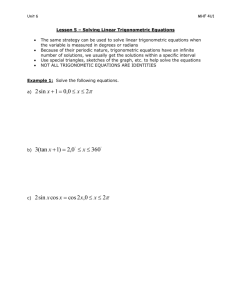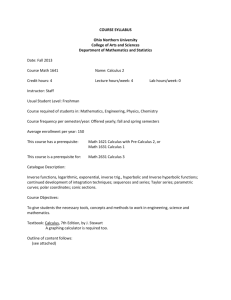generic course syllabus - Oakton Community College
advertisement
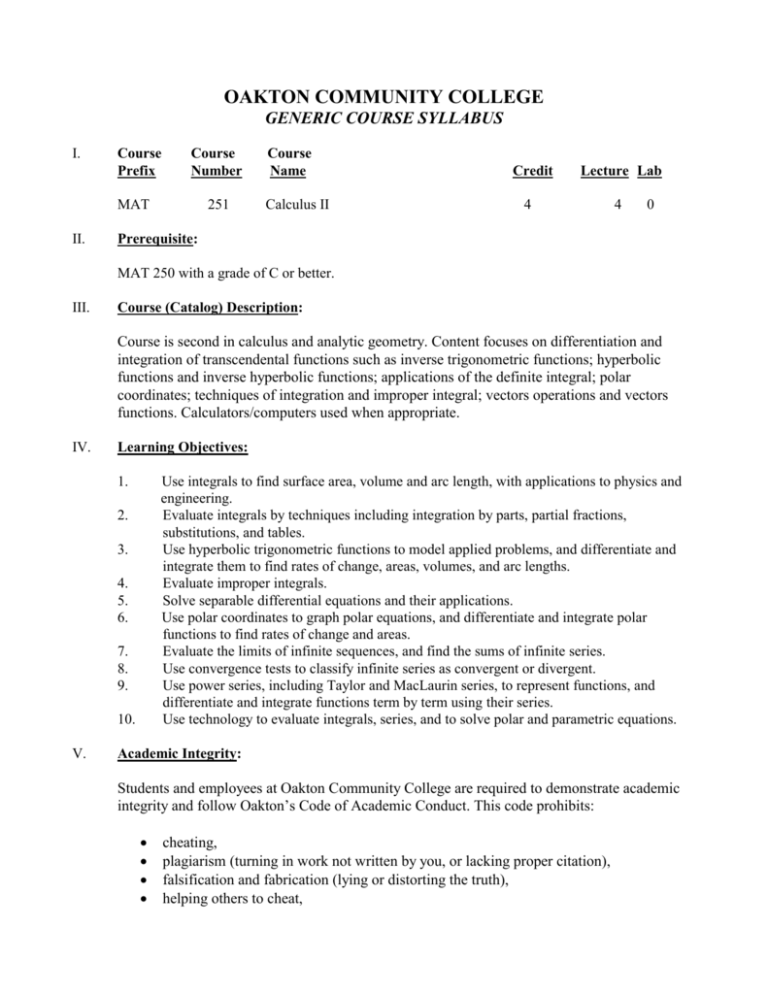
OAKTON COMMUNITY COLLEGE GENERIC COURSE SYLLABUS I. Course Prefix Course Number MAT II. 251 Course Name Calculus II Credit Lecture Lab 4 4 0 Prerequisite: MAT 250 with a grade of C or better. III. Course (Catalog) Description: Course is second in calculus and analytic geometry. Content focuses on differentiation and integration of transcendental functions such as inverse trigonometric functions; hyperbolic functions and inverse hyperbolic functions; applications of the definite integral; polar coordinates; techniques of integration and improper integral; vectors operations and vectors functions. Calculators/computers used when appropriate. IV. Learning Objectives: 1. Use integrals to find surface area, volume and arc length, with applications to physics and engineering. Evaluate integrals by techniques including integration by parts, partial fractions, substitutions, and tables. Use hyperbolic trigonometric functions to model applied problems, and differentiate and integrate them to find rates of change, areas, volumes, and arc lengths. Evaluate improper integrals. Solve separable differential equations and their applications. Use polar coordinates to graph polar equations, and differentiate and integrate polar functions to find rates of change and areas. Evaluate the limits of infinite sequences, and find the sums of infinite series. Use convergence tests to classify infinite series as convergent or divergent. Use power series, including Taylor and MacLaurin series, to represent functions, and differentiate and integrate functions term by term using their series. Use technology to evaluate integrals, series, and to solve polar and parametric equations. 2. 3. 4. 5. 6. 7. 8. 9. 10. V. Academic Integrity: Students and employees at Oakton Community College are required to demonstrate academic integrity and follow Oakton’s Code of Academic Conduct. This code prohibits: cheating, plagiarism (turning in work not written by you, or lacking proper citation), falsification and fabrication (lying or distorting the truth), helping others to cheat, unauthorized changes on official documents, pretending to be someone else or having someone else pretend to be you, making or accepting bribes, special favors, or threats, and any other behavior that violates academic integrity. There are serious consequences to violations of the academic integrity policy. Oakton’s policies and procedures provide students a fair hearing if a complaint is made against you. If you are found to have violated the policy, the minimum penalty is failure on the assignment and, a disciplinary record will be established and kept on file in the office of the Vice President for Student Affairs for a period of 3 years. Details of the Code of Academic Conduct can be found in the Student Handbook. VI. Outline of Topics: A. Recommended: Brief Review of Selected Introductory Calculus Topics: 1. L’Hopital’s Rule and methods of differentiation 2. Using basic integrals and u-substitutions to find the area between curves B. Applications of the Definite Integral 1. Volumes using cross-sectional areas 2. Volumes of solids of revolution using discs, washers, and shells 3. Arc length and Surface Area of Revolution 4. Other applications, such as work, hydrostatics, moments, and/or center of mass C. Hyperbolic Functions: Graphing, Differentiating, Integrating D. Techniques of Integration 1. Integration by parts 2. Integration of rational functions by partial fractions 3. Integration of trigonometric functions 4. Trigonometric substitutions 5. Integration using tables E. Improper Integrals 1. Infinite limits of integration 2. Integration over discontinuities F. Differential Equations and Their Applications 1. Separable differential equations 2. First order differential equations 3. Applications G. Polar Coordinates 1. Graphing with polar coordinates 2. Integration and differentiation using polar coordinates 3. Applications including area, arc length and surface area H. Infinite Sequences and Series 1. Sequences and series 2. Geometric series 3. Tests for positive terms (integral, comparison, ratio, n'th root) 4. Alternating series 5. Absolute and conditional convergence 6. Power series, and Taylor and Maclaurin series 7. Applications including binomial series and solution to differential equations I. VII. Recommended Technology 1. Use of technology to evaluate integrals 2. Use of technology to investigate improper integrals 3. Use of technology to investigate differential equations 4. Use of technology for graphing, integrating, and differentiating parametric and polar equations Methods of Instruction: (To be completed by instructor). Methods of presentation can include lectures, discussion, experimentation, audio-visual aids, smallgroup work and regularly assigned homework. Calculators/computers will be used when appropriate. Use of a computer algebra system is recommended. Mathematica is available for use at the College at no charge. Course may be taught as face-to-face, media-based, hybrid or online course. VIII. Course Practices Required: (To be completed by instructor) IX. Instructional Materials: Note: Current textbook information for each course and section is available on Oakton's Schedule of Classes. Within the Schedule of Classes, textbooks can be found by clicking on an individual course section and looking for the words "View Book Information". Textbooks can also be found at our Mathematics Textbooks page. A graphics calculator is required. A TI-83/84 or higher numbered model will be used for instructional purposes. X. Methods of Evaluating Student Progress: (To be determined and announced by the instructor). Evaluation methods can include grading homework, chapter or major tests, quizzes, individual or group projects, calculator/computer projects and a final examination. XI. Other Course Information: If you have a documented learning, psychological, or physical disability you may be entitled to reasonable academic accommodations or services. To request accommodations or services, contact the Access and Disability Resource Center at the Des Plaines or Skokie campus. All students are expected to fulfill essential course requirements. The College will not waive any essential skill or requirement of a course or degree program. _________________________________________________________________________________ Effective beginning term: Fall 2014 (term) (year) Ending term ___________ (term) (year) Syllabus prepared by: 2013-14 Math Syllabus Committee (chair: P. Boisvert) Date Mar 2014 Reviewed by Dept/Program Chair: J. Hassett Date Mar 2014 Approved by Dean: R. Sompolski Date Mar 2014
